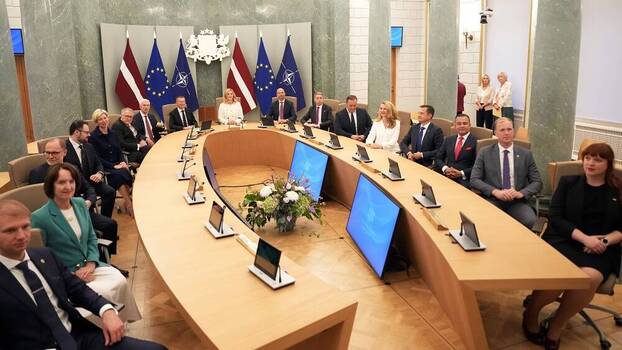
Since the restoration of Latvia’s independence in 1991, Latvian politics has been dominated by the Right. This resulted in neoliberal social and economic policies as well as conservative hegemony in the spheres of culture, gender, and minority rights.
Kristīne Garina is a Latvian activist and chairperson of the LGBT organization Mozaīka.
Yet in the 2017 municipal elections, a new political player, The Progressives, joined the fray. Formed by an activist collective of the same name, the new party contested seats in the country’s 2018 parliamentary elections and the European elections one year later. Although they were not successful, the Progressives’ results proved sufficient to receive state funding and remain a visible presence on the Latvian political scene.
Soon after their came first electoral success — in coalition with the centrist Development/For! Alliance, they won the snap election to the Riga City Council in 2020. In the October 2022 parliamentary election, the Progressives won 6.2% of the vote, giving them ten out of 100 seats in Latvia’s parliament, the Saeima.
The Progressives formally joined the Latvian government on 15 September 2023 after several months of negotiation with the new coalition partners, the technocratic New Unity (the biggest party in the parliament) and the Union of Greens and Farmers. The new coalition began forming after the Latvian Presidential election in late May 2023, after the previous government coalition (also led by New Unity) was not able to agree on a presidential candidate. In its stead, the former Minister of Foreign Affairs Edgars Rinkēvičš was elected president by members of what is now the new coalition.
In the long term, the party intends to continue focusing on creating a more inclusive society for all diversity groups, on reducing gender-based violence, and has stood openly in support of trans people’s right to a safe and respectful transition.
It is important to note that Rinkēvičš is the first openly gay president in the European Union and arguably the most progressive Latvian President ever.
The Progressives have stressed that the new government, led by Prime Minister Evika Siliņa, is the first centre-left government since Latvia regained its independence from the Soviet Union. The Progressives themselves have assumed responsibility for the Ministry of Defence (led by Andris Sprūds), the Ministry of Transportation (led by Kaspars Briškens), and the Ministry of Culture (led by Agnese Logina), which also oversees social integration and media policies.
Since the party’s inception, the Progressives have taken a strong stance on human rights, with a current particular focus on the ratification of the Istanbul Convention and the passing of a same-sex partnership legislation. Both of these have been named as priorities for the new government, with hopes that both might be accomplished by the end of 2023.
In the long term, the party intends to continue focusing on creating a more inclusive society for all diversity groups, on reducing gender-based violence, and has stood openly in support of trans people’s right to a safe and respectful transition.
More broadly, the party has stressed the importance of a healthcare finance reform as well as progressive tax reform. The party is part of the European Greens and has repeatedly stressed the importance of investing in green energy as a response to climate change as well as the war in Ukraine and rapidly increasing energy prices. Ahead of the upcoming winter, the party is pushing for a support plan to help the most vulnerable cover this winter’s energy bills.